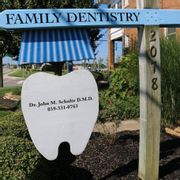A Guide to TMJ Disorders

The temporomandibular joint (TMJ) connects the lower jawbone to the skull. Those with TMJ disorder experience jaw pain in this area, affecting how well they eat or speak. While you should schedule a dental visit for any discomfort you experience, it also helps to understand this condition and its effects. Here's what to know.
What Causes TMJ Disorders?
While it's hard to pinpoint the exact cause of TMJ disorder, there are a few contributing risk factors. For many, the condition can develop after extended bouts of teeth grinding. This act, often caused by stress, can lead to defects within the jaw.
Much like many other areas of the body, arthritis can also impact the jaw joint by wearing down tissues or causing inflammation. People can also experience discomfort after a direct blow or impact to the jaw.
What Are the Symptoms?

In addition to pain, TMJ disorder can lead to jaw stiffness. This issue is common and can impact movement. You can also notice a clicking or popping noise when speaking, chewing, or yawning.
In serious cases, the jaw can even become locked in place, requiring immediate attention from a dentist. Facial pain and tenderness are also common, and this discomfort can pose problems even when the mouth is not in motion.
How Is This Condition Treated?
If tooth grinding contributes to your TMJ disorder, a dentist can create a custom mouth guard to cushion your teeth and jaw. This oral appliance is especially useful for those who unconsciously perform this habit while sleeping.
Treatment can also involve certain medications. A common prescription is corticosteroids, which reduce inflammation within the joint. Your dentist could recommend surgery when severe symptoms disrupt your quality of life. Certain procedures can remove damaged tissues from the joint to improve function and alleviate jaw pain.
When seeking answers for issues with jaw pain, John M. Schulte, DMD, is here to help. Serving patients throughout Covington, KY, for more than four decades, this dental clinic offers general care and restorative treatments to improve the health of your teeth and gums. They also treat patients of all ages, including young children and older adults. Schedule an appointment by calling (859) 331-0763, and learn more about their dental services by visiting the website.
About the Business
Have a question? Ask the experts!
Send your question

